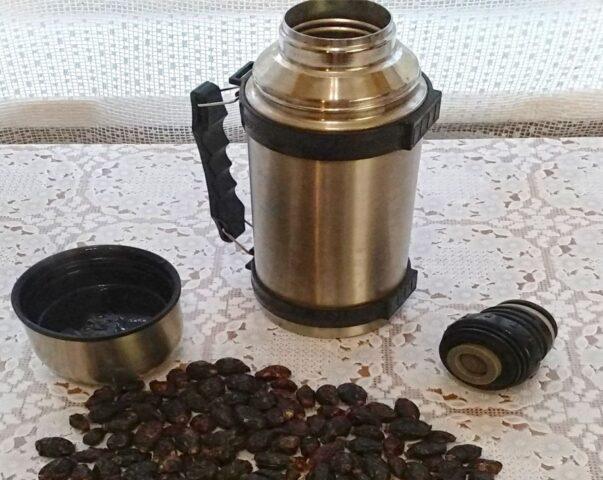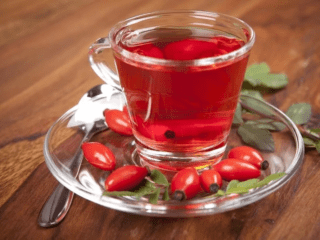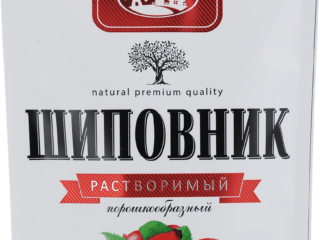Content
Rosehip for gastritis is an ambiguous remedy. The fruits and other parts of this plant have a lot of healing properties, but they cannot always be used. It depends on the form of the disease, the nature of its course, and the individual characteristics of the organism.
Is it possible to drink rose hips for gastritis?
Rose hips are not contraindicated for this disease, but have limitations in some forms. When using herbal remedies, it is important to remember to follow the recommended dosages - exceeding them is fraught with negative consequences.
Is it possible to use rosehip decoction for gastritis?
The plant has a rich composition, rich in vitamins and other valuable elements. Various remedies from this raw material are useful for gastritis, especially when the acidity is low. During an exacerbation, you can take a decoction or jelly, 6-12 months after it - an infusion.
For gastritis with low acidity, taking rosehip oil is effective.It promotes the healing of damaged gastric mucosa.
For gastritis with high acidity, rosehip decoction and other remedies from its fruits are not recommended. This is due to the composition of plant materials, which contain a lot of acids, including ascorbic acid. Along with other substances, this can provoke oxidation, which will only worsen a person’s condition. The ban does not apply to rosehip seed oil. It is especially effective at the initial stage.
Is it possible to use rosehip syrup for atrophic gastritis?
With atrophic gastritis, the gastric mucosa becomes thinner, and its regeneration is impaired. Rosehip syrup has no contraindications for use in this disease. Not only can it be used, but it is also beneficial due to increased tissue regeneration.

Rose hips contain a lot of ascorbic acid, so it can affect the absorption, excretion, and concentration of certain drugs
What are the benefits of rose hips for gastritis?
Rose hips are used in different forms for gastritis. The product has numerous beneficial properties:
- enveloping;
- anti-inflammatory;
- bactericidal (possible causes of gastritis include bacterial infection);
- pain reliever;
- strengthening the immune system;
- enhancing tissue regeneration;
- prevention and treatment of anemia - one of the complications of gastritis;
- positive effect on metabolism;
- decreased vascular permeability;
- reducing the risk of cancer;
- restoration of the body.
The healing properties of rose hips are important for the treatment and prevention of not only gastritis, but also other pathologies, including those not related to it. Any disease weakens the body, reducing its resistance to a number of negative factors.
Methods of preparation and use
Rose hips are used in different forms. Some can be bought at the pharmacy, others you can only prepare yourself. The fruits are used fresh or dried. When harvesting independently, only high-quality raw materials are chosen, collecting them in environmentally friendly places.
Rosehip decoction for gastritis
One of the popular options for gastritis and other diseases is rosehip decoction. It's easy to prepare:
- Pour 0.1 kg of fruit into a suitable container.
- Pour in 0.5 liters of boiling water.
- After boiling, keep on fire for another ten minutes.
To prepare the decoction you need glass or enamel containers. It is not recommended to use metal containers due to the risk of oxidation, during which some of the valuable elements are lost.
For gastritis, drink rose hip decoction three times a day. A glass of the product is enough to take. The decoction is drunk warm after a meal or immediately before it.

Rosehip decoction should not be prepared for future use - it is optimal to make a new portion every day for a day
Not only rosehip fruits, but also its roots have beneficial properties. You can also prepare a decoction for gastritis from them:
- Pour 30 g of chopped roots into a suitable container.
- Pour in 0.3 liters of water.
- Place the container with plant materials in a water bath.
- Cook for 15 minutes.
- Infuse for five hours, wrapped or poured into a thermos.
- Strain.
This decoction is taken three times a day, half a glass. It is consumed warm.
Rosehip infusion for gastritis
Rosehip infusion for gastritis is best done in the evening, using a thermos. The algorithm is simple:
- Pour 1 tsp into a thermos. crushed fruits.
- Pour in 0.3 liters of water. The optimal temperature is 70 °C; boiling water deprives the product of many valuable elements.
- Close tightly.
- Leave for 12 hours.
- Strain.
It’s best to do everything in the evening so that the infusion is ready by morning. It should be dark brown in color with a sour taste and pronounced aroma. Take the infusion three times a day, half a glass.

If there is no thermos, then the container with the infusion can be wrapped in a blanket or terry towel and placed in a warm place
It is effective for gastritis to take rosehip infusion not only from the fruits, but also from the leaves. Prepare the product as follows:
- Pour 1 tsp into a glass. leaves.
- Pour boiling water over it.
- Leave for ten minutes.
- Strain.
This infusion is drunk warm. You can take it three times a day.
Rosehip tea for gastritis
You can buy rosehip tea ready-made or brew it yourself. The algorithm is simple:
- Pour 1 tsp into a mug or teapot. dried fruits.
- Pour in a glass of boiling water.
- Leave for ten minutes.
Rosehip tea is not prepared for future use, but is made in portions before drinking. They drink it warm.
Rosehip syrup for gastritis
Rosehip syrup has a thick consistency. You can buy it at the pharmacy or prepare it yourself. Take 0.4 kg of fruit and sugar, 0.7 liters of water. The algorithm is like this.
- Wash the fruits.
- Remove seeds and stalks.
- Boil half a glass of water.
- Add rose hips and cook for ten minutes.
- Crush the fruits and leave to infuse.
- Make syrup from the rest of the water and sugar and cook for 15 minutes.
- Strain the rose hips.
- Pour the filtered liquid into boiling sugar syrup and stir.
- Pour into sterilized jars or bottles and seal tightly.
Rosehip syrup is taken 1 tbsp. l. per day. The product is washed down with plain water. Store the syrup in the refrigerator.
Kissel
You can prepare such a drink based on fruit decoction or infusion. For 0.45 liters of base product take 4 tbsp. l starch. It is better to use a corn product. You can sweeten the jelly with sugar or fructose. The cooking algorithm is simple:
- Strain the decoction or infusion.
- Bring the liquid to a boil.
- Add starch in a thin stream, stirring constantly.
- Turn off the fire.
- Wait until it cools down.
For gastritis, drink rosehip jelly twice a day, morning and evening. You need half a glass of drink for your appointment.

Kissel is useful for gastritis due to its enveloping effect; the consistency can be made liquid or jelly-like
Rosehip oil
You can buy rosehip oil at a pharmacy or prepare it yourself. The algorithm is like this:
- Grind the seeds to a powder.
- Pour the workpiece into an enamel container.
- Add vegetable oil - take three times more volume than seeds.
- Boil.
- Simmer for 30 minutes, stirring constantly.
- Wait until it cools down.
- Strain.
- Pour into an airtight container.
The finished rosehip oil is stored in the refrigerator. Take it a dessert spoon after meals.

For gastritis with low acidity, only vegetable oil is allowed from fats - up to 2 tsp per day.
Contraindications
Rosehip has many beneficial properties, but is not allowed for everyone. There are few absolute contraindications:
- individual intolerance;
- cholelithiasis (cholelithiasis).
In addition to the main contraindications, rosehip syrup is not given to children under that age. Due to the sugar content, the product is not recommended for diabetics.
Take various rosehip products with caution in the following cases:
- ulcer;
- pancreatitis;
- hypertension;
- tendency to thrombosis;
- myocarditis;
- flatulence;
- constipation
Conclusion
Rose hips for gastritis can be used in the form of a decoction, infusion, tea, jelly, syrup or oil. To prepare such products, dry or fresh fruits, seeds, and leaves of the plant are used. Rose hips have contraindications. In case of high acidity, it is used only in the form of oil.








